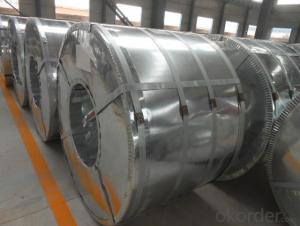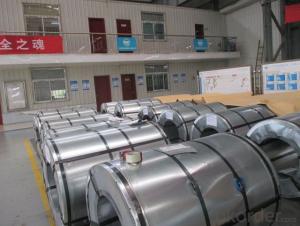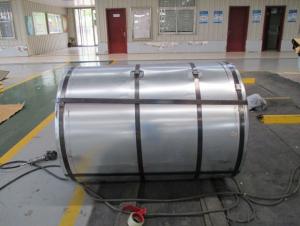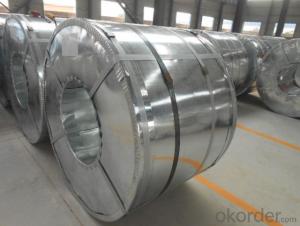STAINLESS STEEL COILS PRIME QUALITY
- Loading Port:
- China Main Port
- Payment Terms:
- TT OR LC
- Min Order Qty:
- -
- Supply Capability:
- -
OKorder Service Pledge
OKorder Financial Service
You Might Also Like
STAINLESS STEEL COILS
Packaging & Delivery
Packaging Detail: seaworthy export package
Delivery Detail: on request
Specifications
1. more than 10 years’ experience on this field
2. advanced equipments
3. competitive price
4. soonest delivery
Product Description :
Commodity
STAINLESS STEEL COILS
Technical Standard: Steel Grade &Standard:J1
Surface Treatment:NO.1
Hot rolled Annealed and Pickled(HRAP)
Grade: J1 , Prime quality
Mill Edge. No connection point in each coil.Component: Ni:1% , Cu: 0.65-0.9%, Cr: 13%, Mn: 10–12%, C: 0.09-0.12%
Package:Properly packed for ocean freight exportation in 20''container
Application::home appliances, constructions, building, machineries
Our Advantages :
1. Expertise:
More than 10 years of manufacture: we know how to properly handle every step of production.
2. Competitive price:
We can offer competitive prices to our customers.
3. Accuracy:
We have excellent technicians and leaders, which can ensure our products are exactly what you want.
4. Materials:
All steel coils are made of high-quality raw materials.
5. Certificate:
Our products are certified by ISO9001.
6. Productivity:
We have large-scales of production lines,, which can guarantee all your orders will be finished in earliest time.
The furnace heating style: improved Sendzimir heating technology
Hourly output: max.76.3t/h
Process after coating: tension leveling, Passivation or oiling
Our Service
Our quality
Test Equipments of Prepainted Galvanized Steel Coil : Salt-spray tester; Atomic absorption spectrophotometer; Rockwell typer hardness tester; Tensile test machine; Metrohm titration; Laboratory Bend test machine.
Our packing
Properly packed for ocean freight exportation in 20''container, galvanized metal fluted rings on inner and outer edges, galvanized metal & waterproof paper wall protection disk, galvanized metal & waterproof paper around circumference.
R&D department
R&D department concentrates on researching and developing reliable products with best quality. The quality department test and control every process of production to guarantee the best quality of product
- Q:Looking for a new entry door for my home If someone would explain the features and benefits of both fiberglass and steel doors I would greatly appreciate it!!
- price and weight. fiberglas is better but more $
- Q:How are steel coils processed for further use?
- Steel coils are processed for further use through a series of steps including uncoiling, leveling, cutting, and shaping. The coils are first uncoiled to separate them into individual sheets. Then, the sheets undergo leveling to remove any imperfections and ensure a flat surface. After that, the sheets are cut into desired lengths or shapes using precision cutting tools. Finally, the cut sheets are shaped according to the specific requirements of their intended application, such as bending, rolling, or stamping.
- Q:What are the different methods of embossing steel coils?
- There are several different methods of embossing steel coils, each with its unique characteristics and applications. Some of the most common methods include: 1. Hot embossing: This method involves heating the steel coil to a high temperature and then pressing it between two engraved rollers. The heat softens the steel, making it easier to imprint the desired pattern onto the surface. Hot embossing is often used to create intricate designs or textures on steel coils. 2. Cold embossing: In contrast to hot embossing, cold embossing does not involve heating the steel coil. Instead, it uses pressure and specially designed dies or stamps to create the desired pattern on the surface. Cold embossing is commonly used for simpler designs or when heat-sensitive materials are involved. 3. Roller embossing: Roller embossing is a method that utilizes a series of rollers with engraved patterns to imprint the design onto the steel coil. The steel coil is passed through the rollers, and the pressure applied causes the pattern to be transferred onto the surface. This method is often used for larger-scale production and can achieve consistent and uniform results. 4. Laser embossing: Laser embossing is a modern method that utilizes laser technology to create patterns on steel coils. The laser beam is directed onto the surface, selectively melting or vaporizing the metal to create the desired design. This method offers high precision and flexibility, making it suitable for intricate and detailed patterns. 5. Press embossing: Press embossing involves the use of a press machine equipped with custom-made dies to imprint the desired pattern onto the steel coil. The coil is placed between the dies, and the press machine applies pressure to transfer the pattern onto the surface. This method is commonly used for large-scale production and can achieve high-speed and high-volume embossing. Overall, the choice of embossing method depends on various factors such as the desired design complexity, production volume, material properties, and cost considerations. Each method has its advantages and limitations, and manufacturers must carefully select the most suitable method for their specific requirements.
- Q:How are steel coils processed before being used in manufacturing?
- Steel coils undergo several processing steps before they are used in manufacturing. These steps typically include cleaning, pickling, cold rolling, annealing, and coating. Cleaning involves removing any dirt or impurities from the surface of the coil. Pickling is a chemical process that removes scale and oxides from the steel, enhancing its surface quality. Cold rolling reduces the thickness and improves the hardness of the steel. Annealing involves heating the coil and then slowly cooling it to enhance its ductility and reduce internal stresses. Lastly, coating is applied to protect the steel from corrosion or to enhance its appearance.
- Q:Can steel coils be coated with anti-corrosive substances?
- Yes, steel coils can be coated with anti-corrosive substances such as zinc, paint, or polymer coatings to protect them from rust and corrosion. These coatings act as a barrier between the steel surface and the surrounding environment, preventing contact with moisture and corrosive elements.
- Q:How are steel coils used in the production of railway tracks?
- Railway tracks rely heavily on steel coils, which are indispensable in their production. These coils, typically made from top-notch steel, are utilized to create the rails that constitute the bedrock of the tracks. The process commences with the unwinding of the steel coils, which are then fed into a sequence of machines that mold and fashion them into the desired rail profile. Initially, the steel coils are passed through a rolling mill, where they undergo gradual flattening and shaping, thereby transforming into elongated steel strips. This technique, known as hot rolling, involves heating the steel to high temperatures to enhance its pliability. The rolling mill exerts substantial pressure on the steel, progressively molding it into the desired rail shape. Once the steel coils have been rolled into the requisite form, they are subsequently severed into individual rail lengths. The length of these rails may vary depending on the specifications of the railway track being produced. The rail lengths then undergo further processing to eliminate any flaws and straighten them out. Following this initial shaping and processing, the rails undergo a series of supplementary treatments. These treatments may entail heat treatment to bolster their strength and durability, as well as various surface treatments to prevent corrosion and wear. Once the rails have undergone all the necessary treatments, they are ready for installation on the railway track. They are laid out meticulously in a predetermined pattern, with each rail securely fastened to the sleepers or ties. The continuous length of steel provided by the coils ensures a seamless and uniform track, enabling trains to travel smoothly and safely. In conclusion, steel coils are crucial components in the production of railway tracks. They are utilized to manufacture the rails that serve as the foundation of the tracks, guaranteeing durability, strength, and a smooth surface for trains to traverse. The use of high-quality steel coils in this process is essential to ensure the safety and efficiency of railway transportation.
- Q:What is the accuracy of steel tape inspection?
- The precision is the minimum scale of this measuring tool. The minimum scale of the steel tape measure is millimeters, and the data below is the reading data,
- Q:How are steel coils used in the manufacturing of building materials?
- Steel coils are widely used in the manufacturing of building materials due to their strength, durability, and versatility. These coils are typically made from high-quality steel and are shaped into a continuous, flat strip. One of the most common uses of steel coils in building materials is for the production of steel roofing and siding. The coils are processed through a series of machines that cut, shape, and roll the steel into the desired dimensions and profiles. The resulting roofing and siding materials are then used to construct durable and weather-resistant building envelopes. Steel coils are also used in the manufacturing of steel studs, which are essential components for framing structures. The coils are cut and formed into precise shapes, then assembled to create a strong and rigid framework for walls, ceilings, and other structural elements. Steel studs offer numerous advantages such as high strength-to-weight ratio, fire resistance, and dimensional stability, making them a popular choice in the construction industry. In addition to roofing, siding, and framing, steel coils are utilized in the production of various other building materials. These include steel pipes, beams, columns, and reinforcement bars, which are used in the construction of foundations, infrastructure, and structural elements. Steel coils also serve as raw materials for the fabrication of metal panels, doors, windows, and other architectural components. Overall, steel coils play a crucial role in the manufacturing of building materials as they provide the necessary strength and durability required for long-lasting and robust structures. Their versatility allows for the production of a wide range of building components, making steel coils an indispensable resource in the construction industry.
- Q:How are steel coils coated?
- Steel coils are typically coated through a process known as coil coating, which involves applying a protective layer to the surface of the steel. This is done by passing the coil through a series of rollers that apply the coating material evenly across the entire surface. The coating can be applied using various methods such as roll coating, spray coating, or electrostatic coating, depending on the desired finish and properties. The coated steel coils are then cured or baked to ensure the coating adheres properly and provides the desired level of protection and durability.
- Q:Can steel coils be coated with thermally insulating materials?
- Yes, steel coils can be coated with thermally insulating materials.
1. Manufacturer Overview |
|
|---|---|
| Location | |
| Year Established | |
| Annual Output Value | |
| Main Markets | |
| Company Certifications | |
2. Manufacturer Certificates |
|
|---|---|
| a) Certification Name | |
| Range | |
| Reference | |
| Validity Period | |
3. Manufacturer Capability |
|
|---|---|
| a)Trade Capacity | |
| Nearest Port | |
| Export Percentage | |
| No.of Employees in Trade Department | |
| Language Spoken: | |
| b)Factory Information | |
| Factory Size: | |
| No. of Production Lines | |
| Contract Manufacturing | |
| Product Price Range | |
Send your message to us
STAINLESS STEEL COILS PRIME QUALITY
- Loading Port:
- China Main Port
- Payment Terms:
- TT OR LC
- Min Order Qty:
- -
- Supply Capability:
- -
OKorder Service Pledge
OKorder Financial Service
Similar products
New products
Hot products
Related keywords





























